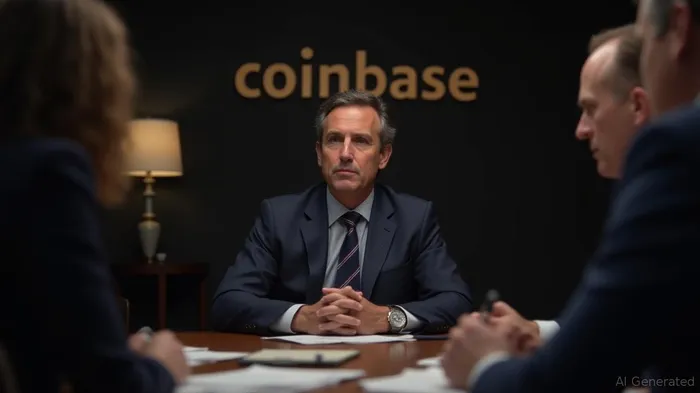Coinbase Adds David Plouffe to Advisory Council for US Crypto Policy Push
In a significant move underscoring the growing intersection of cryptocurrency and traditional politics, Coinbase GlobalCOIN-- has announced the addition of David Plouffe to its Global Advisory Council. This appointment is not just a notable name joining a board; it signals a strategic play by one of the world’s largest cryptocurrency exchanges to navigate the complex political landscape in Washington D.C. and build crucial bipartisan support for the industry.
David Plouffe is a name synonymous with successful political strategy. He served as campaign manager for Barack Obama’s historic 2008 presidential campaign and later as a Senior Advisor to President Obama. His career spans decades at the highest levels of American political campaigning and governance. His expertise lies in understanding public sentiment, crafting compelling narratives, and navigating the intricate machinery of Washington. His decision to join the CoinbaseCOIN-- Advisory Council brings a wealth of experience in policy, communications, and government relations to the cryptocurrency giant. In a sector often perceived as disruptive and sometimes misunderstood by policymakers, having someone with Plouffe’s pedigree can be invaluable.
The Coinbase Global Advisory Council is comprised of distinguished individuals from various fields – politics, finance, technology, and academia. Their primary function is to provide strategic guidance and insights to Coinbase leadership. They don’t hold executive positions or direct operational control, but their counsel helps shape the company’s direction, particularly in areas like regulatory engagement, public perception, and long-term strategy. Adding someone like David Plouffe suggests a specific focus for the council’s work: influencing US crypto policy. As the regulatory environment for digital assets remains fragmented and uncertain in the United States, companies like Coinbase are actively seeking ways to educate lawmakers, advocate for clear and sensible rules, and ensure the industry can innovate responsibly.
The political landscape surrounding cryptocurrency in the U.S. is dynamic. While there has been notable backing from some corners, including vocal support from various Republican lawmakers, the industry still faces skepticism and calls for stringent regulation from others across the political spectrum. True progress and lasting regulatory clarity require consensus. Relying on support from just one political party is risky and unsustainable. Legislation and policy that have broad agreement are more likely to pass, be durable, and provide the stability necessary for the industry to thrive and for mainstream adoption to grow. This is where building bipartisan crypto support becomes paramount. Coinbase, as a major player seeking to operate within established financial systems, needs to build bridges across the aisle. Plouffe’s deep connections and understanding of the Democratic party’s mechanisms can complement existing relationships Coinbase may have with Republican figures, helping to foster a more balanced and widely accepted view of cryptocurrency and blockchain technology in Congress and regulatory agencies.
Coinbase’s appointment of David Plouffe is a clear signal of its commitment to engaging with Washington. It’s part of a broader strategy that includes increased lobbying efforts, the utilization of Political Action Committees (PACs) to contribute to political campaigns, public education campaigns, and strategic hires. The goal is to shape the narrative around crypto, moving it from a niche, speculative asset class to a recognized and integrated part of the future financial system. Having someone with Plouffe’s strategic mind and network on the Coinbase Advisory Council is a significant asset in this endeavor.
What are the potential upsides and hurdles associated with this high-profile appointment? Potential benefits include enhanced access to key Democratic policymakers, improved messaging, strategic insight, and increased legitimacy. However, challenges remain, such as partisan perceptions, industry divisions, regulatory hurdles, and the slow pace of legislation. Despite these obstacles, the appointment of David Plouffe to the Coinbase Advisory Council is a clear indicator that the crypto industry is maturing and investing heavily in political engagement. It underscores the industry’s recognition that its future growth and adoption in the United States are inextricably linked to achieving regulatory clarity and political acceptance.
While no single appointment guarantees policy outcomes, bringing in seasoned political operators like Plouffe is a necessary step for the industry to be taken seriously in Washington. It highlights the transition from crypto being solely a technological or financial discussion to a significant political and policy debate. The push for bipartisan crypto support is vital. It acknowledges that the regulatory framework for digital assets will need to withstand changes in political power. By engaging with figures like Plouffe, Coinbase is positioning itself to influence the conversation across the political spectrum, advocating for policies that foster innovation while addressing legitimate concerns. The effectiveness of this strategy will unfold over time, but the message is clear: the crypto industry is no longer on the sidelines of the political arena. It is actively seeking to shape its own future through strategic engagement and robust crypto lobbying efforts.
David Plouffe joining the Coinbase Global Advisory Council is more than just a headline; it’s a strategic maneuver in the high-stakes game of shaping US crypto policy. By adding a political heavyweight known for navigating complex environments and building winning coalitions, Coinbase is signaling its intent to seriously engage with Washington D.C. The goal is clear: foster bipartisan support, advocate for sensible regulation, and pave the way for the mainstream adoption of digital assets. While challenges remain, this appointment, coupled with increased crypto lobbying and educational efforts, demonstrates the industry’s commitment to working within the established political system. The future of crypto in the U.S. will likely be determined as much by policy debates in Washington as by technological innovation, making strategic appointments like this absolutely critical.

Comprender rápidamente la historia y el origen de diversas monedas muy conocidas
Latest Articles
Stay ahead of the market.
Get curated U.S. market news, insights and key dates delivered to your inbox.

Comments
No comments yet